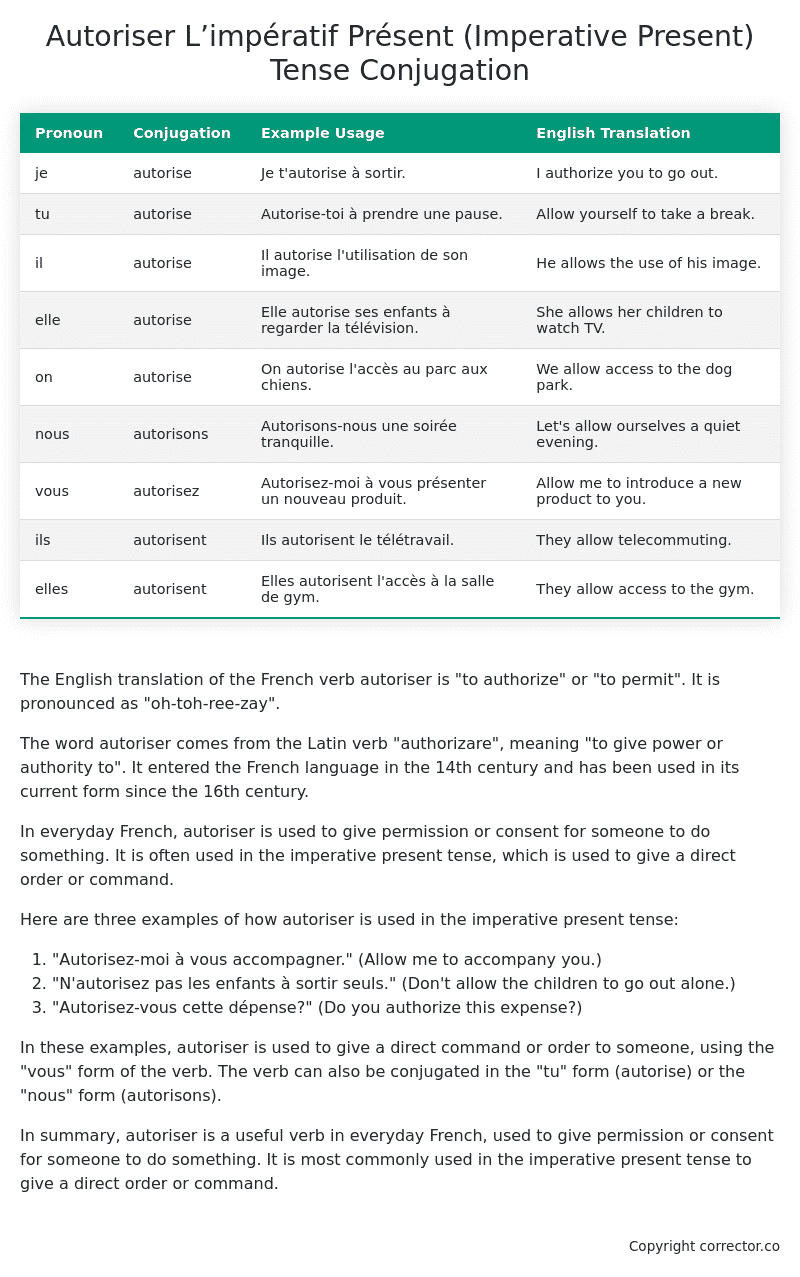L’impératif Présent (Imperative Present) Tense Conjugation of the French Verb autoriser
Introduction to the verb autoriser
The English translation of the French verb autoriser is “to authorize” or “to permit”. It is pronounced as “oh-toh-ree-zay”.
The word autoriser comes from the Latin verb “authorizare”, meaning “to give power or authority to”. It entered the French language in the 14th century and has been used in its current form since the 16th century.
In everyday French, autoriser is used to give permission or consent for someone to do something. It is often used in the imperative present tense, which is used to give a direct order or command.
Here are three examples of how autoriser is used in the imperative present tense:
- “Autorisez-moi à vous accompagner.” (Allow me to accompany you.)
- “N’autorisez pas les enfants à sortir seuls.” (Don’t allow the children to go out alone.)
- “Autorisez-vous cette dépense?” (Do you authorize this expense?)
In these examples, autoriser is used to give a direct command or order to someone, using the “vous” form of the verb. The verb can also be conjugated in the “tu” form (autorise) or the “nous” form (autorisons).
In summary, autoriser is a useful verb in everyday French, used to give permission or consent for someone to do something. It is most commonly used in the imperative present tense to give a direct order or command.
Table of the L’impératif Présent (Imperative Present) Tense Conjugation of autoriser
| Pronoun | Conjugation | Example Usage | English Translation |
|---|---|---|---|
| je | autorise | Je t’autorise à sortir. | I authorize you to go out. |
| tu | autorise | Autorise-toi à prendre une pause. | Allow yourself to take a break. |
| il | autorise | Il autorise l’utilisation de son image. | He allows the use of his image. |
| elle | autorise | Elle autorise ses enfants à regarder la télévision. | She allows her children to watch TV. |
| on | autorise | On autorise l’accès au parc aux chiens. | We allow access to the dog park. |
| nous | autorisons | Autorisons-nous une soirée tranquille. | Let’s allow ourselves a quiet evening. |
| vous | autorisez | Autorisez-moi à vous présenter un nouveau produit. | Allow me to introduce a new product to you. |
| ils | autorisent | Ils autorisent le télétravail. | They allow telecommuting. |
| elles | autorisent | Elles autorisent l’accès à la salle de gym. | They allow access to the gym. |
Other Conjugations for Autoriser.
Le Present (Present Tense) Conjugation of the French Verb autoriser
Imparfait (Imperfect) Tense Conjugation of the French Verb autoriser
Passé Simple (Simple Past) Tense Conjugation of the French Verb autoriser
Passé Composé (Present Perfect) Tense Conjugation of the French Verb autoriser
Futur Simple (Simple Future) Tense Conjugation of the French Verb autoriser
Futur Proche (Near Future) Tense Conjugation of the French Verb autoriser
Plus-que-parfait (Pluperfect) Tense Conjugation of the French Verb autoriser
Passé Antérieur (Past Anterior) Tense Conjugation of the French Verb autoriser
Futur Antérieur (Future Anterior) Tense Conjugation of the French Verb autoriser
Subjonctif Présent (Subjunctive Present) Tense Conjugation of the French Verb autoriser
Subjonctif Passé (Subjunctive Past) Tense Conjugation of the French Verb autoriser
Subjonctif Imparfait (Subjunctive Imperfect) Tense Conjugation of the French Verb autoriser
Subjonctif Plus-que-parfait (Subjunctive Pluperfect) Tense Conjugation of the French Verb autoriser
Conditionnel Présent (Conditional Present) Tense Conjugation of the French Verb autoriser
Conditionnel Passé (Conditional Past) Tense Conjugation of the French Verb autoriser
L’impératif Présent (Imperative Present) Tense Conjugation of the French Verb autoriser (this article)
L’infinitif Présent (Infinitive Present) Tense Conjugation of the French Verb autoriser
Struggling with French verbs or the language in general? Why not use our free French Grammar Checker – no registration required!
Get a FREE Download Study Sheet of this Conjugation 🔥
Simply right click the image below, click “save image” and get your free reference for the autoriser L’impératif Présent tense conjugation!

Autoriser – About the French L’impératif Présent (Imperative Present) Tense
Usage
Giving commands
Making requests
Offering advice
Expressing desires
Conjugation Formation
Interactions with other tenses
Want More?
I hope you enjoyed this article on the verb autoriser. Still in a learning mood? Check out another TOTALLY random French verb conjugation!


